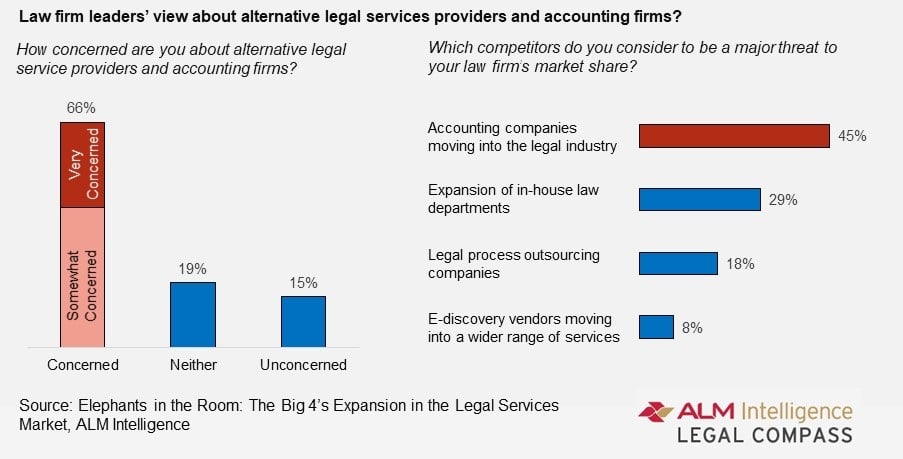Lawyers and Accountants: Collaborators and Competitors in the Multidisciplinary Age
Lawyers and accountants are professional allies, but who controls integration and delivery of their services is another story.
July 12, 2018 at 09:00 AM
8 minute read
 A recent speech to a global network of lawyers and accountants highlighted the curious relationship they share. Lawyers and accountants are simultaneously collaborators and competitors. The paradox is reconciled by separating the professional and business/organizational elements of their dynamic.
A recent speech to a global network of lawyers and accountants highlighted the curious relationship they share. Lawyers and accountants are simultaneously collaborators and competitors. The paradox is reconciled by separating the professional and business/organizational elements of their dynamic.
Lawyers and accountants share several common challenges and often collaborate. At the same time, law and accounting firms—as well as other professional service organizations- “alternative legal service providers” (ALSP's), consultancies, and technology companies-compete for market share in a rapidly converging, multidisciplinary professional services marketplace. Disaggregation of legal and accounting functions now cuts across the professions. What matters is what services consumers want to purchase, from what provider, and at what price. Consumers are reshaping once clear boundaries separating law and accounting.
The question is not whether lawyers will supplant accountants or vice versa– there is rising demand for each profession's (core) services. The issue is which profession, to paraphrase Reggie Jackson, will be “the straw that stirs the drink” and manage a multidisciplinary delivery structure. Traditional definitions of law and accounting firms are already outdated from a functional, economic, and corporate consumer perspective. Deloitte cannot operate as a law firm in the U.S., but it has nearly three times the legal market share of Kirkland, the world's largest law firm by revenue.
The Two Professions Share Common Challenges
The legal and accounting professions have much in common: self-regulation; a professional/industry duality; transition from guild to big business; labor-intensive, leveraged economic models that are morphing into tech and process-enabled ones; accountant and lawyer time is leveraged by machines, process, and other human resources, thereby redefining what it means to be a legal/accounting professional; intensifying internal and external competition; and elevated consumer expectations in an increasingly fast-moving, complex, global business environment.
Many tasks that accountants and lawyers once routinely performed are now up for grabs—they are becoming digitized and/or tasked to other professionals and paraprofessionals. The parameters of “professional competency” and what that means functionally is yet another common challenge. Just as “knowledge of the law” alone no longer cuts it for lawyers, so too is “an ability to crunch numbers” insufficient to ensure a successful career in accountancy. The marketplace demands “T-shaped” professionals—that means in addition to subject matter competency, lawyers and accountants must also have technological proficiency, collaborative, and “people skills,” and an understanding of project and process management. These augmented skillsets demand a reconfiguration of professional school curricula and training. Continuing professional education/training—not rote box checking exercises—must become part of each profession's culture and practice to ensure alignment with rapidly changing market needs.
Who Will Bundle Professional Services?
Law and accounting are professions and enormous businesses. Most sources peg legal spend close to $1 trillion per year and accounting at about half that amount. The boundaries separating the two industries are becoming increasingly blurred. There are several explanations: (1) greed; (2) the decentralized legal market; (3) the emergence of technology and process as key delivery components; (4) client demand for rapid, scalable solutions; (5) the complexity of business and its need for fast, holistic, scalable, multidisciplinary solutions; (6) regulatory changes; (7) consolidation of other industries—including medicine, accounting, and other professional services; and (8) buyer demand for “better, faster, cheaper” goods and services and their growing willingness to explore new options.
Corporate consumers confront complex business challenges that require multiple skillsets and expertise. Buyers are exercising leverage over providers and fomenting competition that cuts across professional lines. They demand thoughtful recommendations from which to make informed business judgments, not piecemeal opinions from a multiplicity of professional sources. Business decisions frequently involve the confluence of regulatory, financial, legal, risk management, technological, and cultural issues that transcend law or accounting. An integrated, multidisciplinary solution is the direction the marketplace is headed. The graphic below depicts Ernst & Young's integration roadmap which is consistent with the approach taken by others in the Big Four. Market fragmentation, languid adoption of technology and process, and consumer demand for new delivery options render many traditional law firms that stay their present course susceptible to defections, takeovers, and implosions.

Can't Tell the Providers Without a Scorecard
The long-standing boundaries that separated law and accounting have blurred. Compare the service offerings of the Big Four-or ALSP's like UnitedLex, Axiom, or Integreon- and it's hard to tell one from the other. Each vies for business from the same client pool in a host of service lines that include finance, risk management, mergers and acquisitions, litigation support, cybersecurity, data management, and contracts. Yet even as they compete vigorously for business, law firms, accounting firms from small shops to the Big Four, and ALSP's routinely collaborate. Magic Circle stalwart Allen & Overy (A&O), for example, partnered with Deloitte to develop and market a digital derivatives compliance system called MarginMatrix. Several regional and global law and accounting networks enable members to pair expertise to compete with the single-branded Big Four networks. ALSP's collaborate with large law firms and in-house legal departments, melding competencies to provide scalable, integrated, and effective customer solutions. Tens of thousands of lawyers are already employed by the Big Four, ALSP's, and consultancies. Many more work on a “gig” basis. This begs the question: what's the difference between a law firm, an accounting firm, or an alternative legal service provider in today's market? Short answer: from the consumer perspective, it's ceasing to matter.
Many in the legal industry regard the Big Four as an existential threat. Legal pundits have closely monitored the Big Four's renewed incursion into the 'legal' space, and many have opined that it's only a matter of time before they dominate the legal market. A 2015 Economist article titled “Attack of the Bean-Counters” lays out the case compellingly. It cites the size, capital, global reach, C-suite penetration, technological and process expertise, and global brands of the Big Four as marketplace advantages over law firms. The Big Four—and other “alternative legal service providers” (ALSP's, a term used to describe companies that provide legal services from a non-traditional law firm partnership structure) indeed have a global footprint in the “legal” space.

The Americas percentage will increase when the U.S., the world's largest market by legal spend, reregulates its antiquated, protectionist rules that prohibit “non-lawyer” investment, ownership, and control of law firms. Those rules are routinely circumnavigated by a growing list of legal providers that separate the “practice” of law from the “business of law.” That means that law firms—whose demand for services has remained flat for five years and counting in an expanding market—will face even stiffer competition from 'outside' competitors. The threat of accounting firms and other ALSP's—especially large, well-capitalized, tech and process savvy ones like United Lex and Axiom–is very much on the minds of law firm leaders. Raising associate salaries, increasing marketing budgets, and hiring “chief innovation officers” will not help their cause. Focusing on consumer satisfaction, differentiated service offerings and delivery capability (organic, acquired, or collaborative) will.

Who Has the Required Expertise?
The issue is not whether accountants will marginalize lawyers or vice versa. It's whose expertise is required—and how, when, from what delivery structure, at what cost, and under whose management lawyers and accountants are deployed. Whether this comes from the Big Four, a mega- law firm like Dentons, a UnitedLex-type ALSP, or elsewhere is not what's of primary importance to consumers. What does matter is that providers offer consistent, rapid, data-driven, inter-disciplinary responses to business challenges that deliver impact and value to consumers.
Expertise now has three dimensions when applied to legal delivery: (1) professional (differentiated practice experience, skills, and/or knowledge); (2) delivery—the business of law; and (3) customer relations. Providers that meld the three dimensions of legal expertise with other disciplines—technology, business, and data analytics to cite a few—will dominate the emerging multidisciplinary global market.
Conclusion
Law and accounting are professions and industries. As professionals, each sets its own practice and ethical standards and monitors practitioners to ensure compliance. Both professions would be well served to expose students—and practitioners—to cross-training and familiarity with the other's nomenclature, culture, and key precepts. This will inure to the benefit of each profession and, more importantly, “move the needle” for consumers of their services. Whether “legal” and “accounting” are delivered from law firms, accounting firms, ALSP's, or some other source, is secondary to the results obtained for consumers. Buyers are driving the bus now, and providers that deliver consistent, efficient, risk-appropriate, multidisciplinary, value-driven solutions to business challenges will thrive. The marketplace will determine which providers do that best, however they are labeled.

Mark A. Cohen is the CEO of Legal Mosaic, a legal business consultancy and a Distinguished Fellow at Northwestern University Pritzker School of Law.
More information on the ALM Intelligence Fellows Program can be found here
This content has been archived. It is available through our partners, LexisNexis® and Bloomberg Law.
To view this content, please continue to their sites.
Not a Lexis Subscriber?
Subscribe Now
Not a Bloomberg Law Subscriber?
Subscribe Now
NOT FOR REPRINT
© 2025 ALM Global, LLC, All Rights Reserved. Request academic re-use from www.copyright.com. All other uses, submit a request to [email protected]. For more information visit Asset & Logo Licensing.
You Might Like
View All


Law firms need to consider a range of options for achieving their aspirations
8 minute read
Trending Stories
- 1Uber Files RICO Suit Against Plaintiff-Side Firms Alleging Fraudulent Injury Claims
- 2The Law Firm Disrupted: Scrutinizing the Elephant More Than the Mouse
- 3Inherent Diminished Value Damages Unavailable to 3rd-Party Claimants, Court Says
- 4Pa. Defense Firm Sued by Client Over Ex-Eagles Player's $43.5M Med Mal Win
- 5Losses Mount at Morris Manning, but Departing Ex-Chair Stays Bullish About His Old Firm's Future
Who Got The Work
J. Brugh Lower of Gibbons has entered an appearance for industrial equipment supplier Devco Corporation in a pending trademark infringement lawsuit. The suit, accusing the defendant of selling knock-off Graco products, was filed Dec. 18 in New Jersey District Court by Rivkin Radler on behalf of Graco Inc. and Graco Minnesota. The case, assigned to U.S. District Judge Zahid N. Quraishi, is 3:24-cv-11294, Graco Inc. et al v. Devco Corporation.
Who Got The Work
Rebecca Maller-Stein and Kent A. Yalowitz of Arnold & Porter Kaye Scholer have entered their appearances for Hanaco Venture Capital and its executives, Lior Prosor and David Frankel, in a pending securities lawsuit. The action, filed on Dec. 24 in New York Southern District Court by Zell, Aron & Co. on behalf of Goldeneye Advisors, accuses the defendants of negligently and fraudulently managing the plaintiff's $1 million investment. The case, assigned to U.S. District Judge Vernon S. Broderick, is 1:24-cv-09918, Goldeneye Advisors, LLC v. Hanaco Venture Capital, Ltd. et al.
Who Got The Work
Attorneys from A&O Shearman has stepped in as defense counsel for Toronto-Dominion Bank and other defendants in a pending securities class action. The suit, filed Dec. 11 in New York Southern District Court by Bleichmar Fonti & Auld, accuses the defendants of concealing the bank's 'pervasive' deficiencies in regards to its compliance with the Bank Secrecy Act and the quality of its anti-money laundering controls. The case, assigned to U.S. District Judge Arun Subramanian, is 1:24-cv-09445, Gonzalez v. The Toronto-Dominion Bank et al.
Who Got The Work
Crown Castle International, a Pennsylvania company providing shared communications infrastructure, has turned to Luke D. Wolf of Gordon Rees Scully Mansukhani to fend off a pending breach-of-contract lawsuit. The court action, filed Nov. 25 in Michigan Eastern District Court by Hooper Hathaway PC on behalf of The Town Residences LLC, accuses Crown Castle of failing to transfer approximately $30,000 in utility payments from T-Mobile in breach of a roof-top lease and assignment agreement. The case, assigned to U.S. District Judge Susan K. Declercq, is 2:24-cv-13131, The Town Residences LLC v. T-Mobile US, Inc. et al.
Who Got The Work
Wilfred P. Coronato and Daniel M. Schwartz of McCarter & English have stepped in as defense counsel to Electrolux Home Products Inc. in a pending product liability lawsuit. The court action, filed Nov. 26 in New York Eastern District Court by Poulos Lopiccolo PC and Nagel Rice LLP on behalf of David Stern, alleges that the defendant's refrigerators’ drawers and shelving repeatedly break and fall apart within months after purchase. The case, assigned to U.S. District Judge Joan M. Azrack, is 2:24-cv-08204, Stern v. Electrolux Home Products, Inc.
Featured Firms
Law Offices of Gary Martin Hays & Associates, P.C.
(470) 294-1674
Law Offices of Mark E. Salomone
(857) 444-6468
Smith & Hassler
(713) 739-1250








